You could increase France's diplomatical relation limit through the national ideas if you want to divide them further.Speaking of France, they do have three vassals. Even up until the end of the game, the AI never destroyed the k_aquitaine title, so I decided to leave the King of Aquitaine as a vassal, imagining it was a very strong cultural center that maintained its own traditions and such. I modded all the provinces to the Aquitaine culture, whereas most of France is Cosmpolitain. Navarra is also a vassal, because I get the feeling that France never paid too much attention there, except to occasionally conquer another province while the other Iberian nations were busy fighting. And you can't see it on this map, but Jerusalem is also France's vassal, so the empire is decentralized a bit. I could possibly justify making one more vassal up along the northern coast, but I might be straining France's diplomatic options at that point by using up so many slots.
The Long(er) Lasting Lombards (Lombard Mega-Campaign pt. 2)
- Thread starter RedTemplar
- Start date
-
We have updated our Community Code of Conduct. Please read through the new rules for the forum that are an integral part of Paradox Interactive’s User Agreement.
You are using an out of date browser. It may not display this or other websites correctly.
You should upgrade or use an alternative browser.
You should upgrade or use an alternative browser.
True, I could. Though I'm tempted to not divide them too far. They might be powerful as of now, but I feel like their subdivisions make political sense given where the world is at.
Sub-a-dub-dub!
Converted games tend to be wacky, bland and tiresome, but you seem to be putting in enough work to turn it from an interesting gimmick into a fully developed alternate world. Crafting the national ideas and looking at the CK2 history to tweak the EUIV world will give you a personalised and deep map that can never be matched by an automated converter. Well done! I eagerly await the moment that you press play and, unleash hell!
Converted games tend to be wacky, bland and tiresome, but you seem to be putting in enough work to turn it from an interesting gimmick into a fully developed alternate world. Crafting the national ideas and looking at the CK2 history to tweak the EUIV world will give you a personalised and deep map that can never be matched by an automated converter. Well done! I eagerly await the moment that you press play and, unleash hell!
It definitely requires a lot of modding -- I don't like the way it handles cultures and religions at all. But with enough effort I think I can create enough interesting situations to make this intriguing. Time will tell! Maybe I'll even learn to mod some events along the way
The Iberian Peninsula
1444 AD
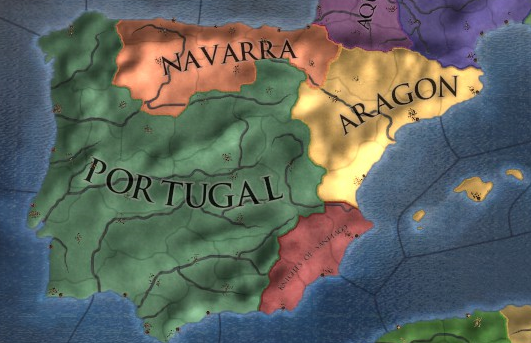
Aragon
The liberation of the Iberian peninsula from its Islamic conquerors began in 900 AD, when Pope Vitalian II declared the First Crusade with the Kingdom of Aragon as its goal. After Arnifrid II Bavarae, the Lombard Duke of Friuli, proved instrumental in the crusade's success, Vitalian granted Arnifrid the ducal rule of the conquered lands, with the King of Lombardy also claiming kingship over the region. The native Muslim population fled quickly, and the rule of local counties in Aragon was filled with migrants from the Italian peninsula. Lombardy was ruled by a relatively static line up of influential noble families, so many opportunistic lords traveled to the new lands to pursue wealth and power in a new Aragonese nobility. There, they built an enduring kingdom that has endured Muslim counterattacks and the expansionist ambitions of Galicia and Portugal, largely thanks to the dedicated support of the Bavarae emperors of Italy.
Though Aragon is smaller than neighboring Portugal, the ambitious and opportunistic Aragonese nobles have a sense for business and trade, and the potential to excel at both with direct access to the Mediterranean. While it is unlikely that they will come to dominate Iberia, they are in a favorable position to work the local trade market and seek opportunities to colonize abroad. With a strong navy and the right investments, Aragon could become a prosperous Mediterranean nation.
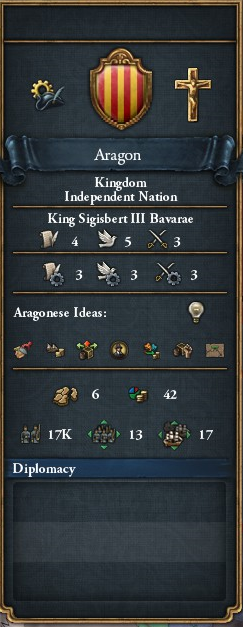
Traditions: +10% Galley Combat Ability / +10% National Trade Income
Ambition: +25% Naval Force Limit
National Ideas
Papal Grant: "Our Lombard Crusader ancestors were given this land by the decree of Pope Vitalian II. Though we may not be natives to this land, we possess it by the divine will of God and the Church; let no one dare claim otherwise." (+100% Hostile Core Creation Cost)
Protection of the Coastlines: As in vanilla. (-25% Galley Cost)
Mediterranean Trade: As in vanilla.(+20% Trade Steering)
Entrepreneurial Nobility: "Our kingdom was settled by ambitious native Lombards who sought political & economic opportunities outside of their homeland in uncharted territory. With the promise of riches in the new world, many of our wealthy noble families are prepared to invest heavily in the establishment of new colonies." (+1 Colonist / +15 Global Settler Increase)
Lombard Culturalism: "We are Lombards in a land of Spaniards, and we have never succumbed to cultural assimilation. We are proud of our heritage, and we will spread the Lombard ways wherever our flag is raised." (+1 Colonist / -25% Cultural Conversion Cost)
Chartered Merchant Companies: As in vanilla.(+20% Global Trade Power)
Reforming the Administration: As in vanilla.(-15% Reduce Inflation Cost)
Portugal
While the Kingdom of Aragon arose out of the First Crusade's victories, it never expanded very far past its initial size. On the other hand, the kings of the de Cantabria family, who ruled the Kingdom of Galicia, led the charge of the bloody Reconquista. With the help of the Lombards, the Galicians recaptured the majority share of the Iberian peninsula, eventually claiming the Kingdom of Portugal as their primary title after a series of independence disputes during the High Middle Ages. To this day, Portugal remains the most dominant power in the region.
With control over most of the peninsula, Portugal can field an army and navy far superior to Aragon, and would easily overtake Navarra were it not for the support of its French overlords. Portugal finds itself seeking a delicate balance between maintaining a powerful army to keep control at home, and forming an expansive navy capable of sustaining trade and colonization. If French ambitions in Iberia can be held in check, Portugal is poised to become a true Great Power with its overseas potential.
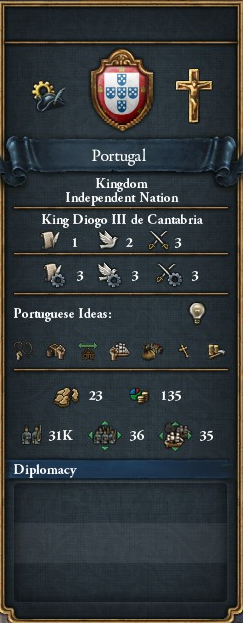
Traditions: +30% Trade Range / +5% Trade Efficiency
National Ideas
The Reconquista: Vanilla Spanish (+5% Discipline)
Straight of Gibraltar: Vanilla Granadan (+10% Domestic Trade Power / +10% Trade Steering)
Legacy of the Navigator: Vanilla Portuguese (+25% Colonial Range)
Portuguese Armada: Vanilla Spanish (Renamed) (+10% Heavy Ship Combat Ability)
Afonsine Ordinances: Vanilla Portuguese (+10% Goods Produced Nationally)
Devout Catholicism: Vanilla Spanish (+2 Yearly Papal Influence)
Royal Absolutism: Vanilla Portuguese (-25% Build Cost)
Knights of Santiago
When Duke Arnifrid II was awarded land in Aragon at the conclusion of the First Crusade, he granted a small portion of land at the far south of Aragon to the Knights of Santiago, in recognition of their contributions to the Crusade. The Knights never relinquished that land, and in 1444 they remain the longest continuously-landed Christian Holy Order in the world. The Knights made a few attempts to expand along the southern coast, but never grew to more than a few small counties along the southeastern edge of the peninsula.
As the Medieval era prepares to draw toward its close, the Knights of Santiago find themselves searching for relevance and identity. The Reconquista has long since been successful, and the attempts of the Umayyad Muslims to return to Iberia have been swiftly crushed by the cooperating armies of the Knights and Portugal. Without a consistent infidel threat to battle, some have claimed that the very existence of their order in Iberia has become obsolete. Under the leadership of the masterful commander Grandmaster Pelayo, the Knights of Santiago must choose a course for their destiny if they wish to have a future in the emerging modern world.
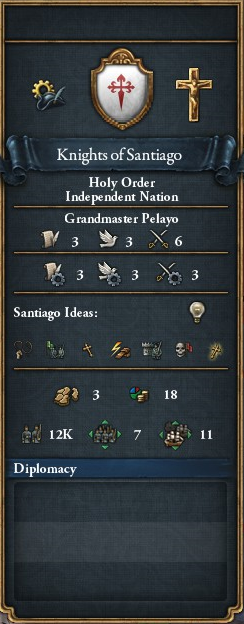
Traditions: +20% Infantry Combat Power / +15% Fort Defense
National Ideas
Holy Guardians of Iberia: "Since the First Crusade, the men of our Order have lived to defend the Iberian peninsula from the vile Muslims. Our soldiers are elite warriors, hardened by a lifetime of training and prayer, ready to face the greatest foes for the glory of God." (+10% Discipline)
Pilgrim Soldiers: "If we are to compete with larger nations, we cannot rely solely on small forces of elite knights. In order to fill the ranks of our armies, we will call Catholic soldiers from around the world to join our ranks with the promise of indulgences for those who serve honorably." (+10% Manpower / +10% Manpower Recovery)
Papal Favor: "While many Holy Orders have since faded from history, the Knights of Santiago remain strong. For centuries, the Popes have praised our dedication to Christ and Christendom, and we enjoy great favor in Rome as a result." (+3 Annual Papal Influence)
Knightly Commanders: "Our armies may be drawn from common recruits, but our historical knightly families will help ensure we have officers with impeccable pedigree." (+1 Land Leader Shock)
Onward Christian Soldiers:Vanilla Divine (+15% Garrison Growth)
One State, One Religion:Vanilla Teutonic (+1Tolerance of the True Faith)
Navarra
France's relationship with Iberia during the High Middle Ages was an often tense and uneven one. At times, the French monarchs seemed totally disinterested in the border conflicts between Aragon and Portugal, or with Portugal's attempts to subdue unruly dukes. At other times, certain French Kings and Emperors suddenly turned against the Iberian people, conquering small areas of land along the northern Iberian coast. The predominantly Basque region of the northern coastline is governed as a vassalized minor kingdom of the French Empire, though its participation in French politics has historically been minimal.
With the backing of the great blue empire, the Navarrans could wage a successful effort to wrest power in the peninsula from Portugal, but it remains to be seen if increased Navarran autonomy would have a negative effect on their relations with France.
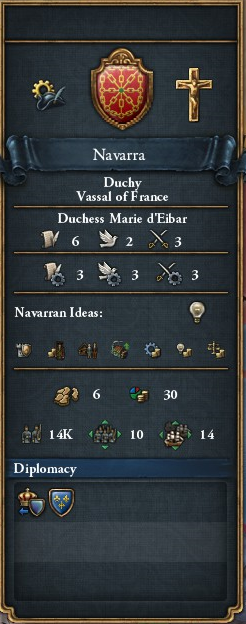
Navarra uses all of the vanilla Navarran ideas.
1444 AD

Aragon
The liberation of the Iberian peninsula from its Islamic conquerors began in 900 AD, when Pope Vitalian II declared the First Crusade with the Kingdom of Aragon as its goal. After Arnifrid II Bavarae, the Lombard Duke of Friuli, proved instrumental in the crusade's success, Vitalian granted Arnifrid the ducal rule of the conquered lands, with the King of Lombardy also claiming kingship over the region. The native Muslim population fled quickly, and the rule of local counties in Aragon was filled with migrants from the Italian peninsula. Lombardy was ruled by a relatively static line up of influential noble families, so many opportunistic lords traveled to the new lands to pursue wealth and power in a new Aragonese nobility. There, they built an enduring kingdom that has endured Muslim counterattacks and the expansionist ambitions of Galicia and Portugal, largely thanks to the dedicated support of the Bavarae emperors of Italy.
Though Aragon is smaller than neighboring Portugal, the ambitious and opportunistic Aragonese nobles have a sense for business and trade, and the potential to excel at both with direct access to the Mediterranean. While it is unlikely that they will come to dominate Iberia, they are in a favorable position to work the local trade market and seek opportunities to colonize abroad. With a strong navy and the right investments, Aragon could become a prosperous Mediterranean nation.

Traditions: +10% Galley Combat Ability / +10% National Trade Income
Ambition: +25% Naval Force Limit
National Ideas
Papal Grant: "Our Lombard Crusader ancestors were given this land by the decree of Pope Vitalian II. Though we may not be natives to this land, we possess it by the divine will of God and the Church; let no one dare claim otherwise." (+100% Hostile Core Creation Cost)
Protection of the Coastlines: As in vanilla. (-25% Galley Cost)
Mediterranean Trade: As in vanilla.(+20% Trade Steering)
Entrepreneurial Nobility: "Our kingdom was settled by ambitious native Lombards who sought political & economic opportunities outside of their homeland in uncharted territory. With the promise of riches in the new world, many of our wealthy noble families are prepared to invest heavily in the establishment of new colonies." (+1 Colonist / +15 Global Settler Increase)
Lombard Culturalism: "We are Lombards in a land of Spaniards, and we have never succumbed to cultural assimilation. We are proud of our heritage, and we will spread the Lombard ways wherever our flag is raised." (+1 Colonist / -25% Cultural Conversion Cost)
Chartered Merchant Companies: As in vanilla.(+20% Global Trade Power)
Reforming the Administration: As in vanilla.(-15% Reduce Inflation Cost)
Portugal
While the Kingdom of Aragon arose out of the First Crusade's victories, it never expanded very far past its initial size. On the other hand, the kings of the de Cantabria family, who ruled the Kingdom of Galicia, led the charge of the bloody Reconquista. With the help of the Lombards, the Galicians recaptured the majority share of the Iberian peninsula, eventually claiming the Kingdom of Portugal as their primary title after a series of independence disputes during the High Middle Ages. To this day, Portugal remains the most dominant power in the region.
With control over most of the peninsula, Portugal can field an army and navy far superior to Aragon, and would easily overtake Navarra were it not for the support of its French overlords. Portugal finds itself seeking a delicate balance between maintaining a powerful army to keep control at home, and forming an expansive navy capable of sustaining trade and colonization. If French ambitions in Iberia can be held in check, Portugal is poised to become a true Great Power with its overseas potential.

Traditions: +30% Trade Range / +5% Trade Efficiency
National Ideas
The Reconquista: Vanilla Spanish (+5% Discipline)
Straight of Gibraltar: Vanilla Granadan (+10% Domestic Trade Power / +10% Trade Steering)
Legacy of the Navigator: Vanilla Portuguese (+25% Colonial Range)
Portuguese Armada: Vanilla Spanish (Renamed) (+10% Heavy Ship Combat Ability)
Afonsine Ordinances: Vanilla Portuguese (+10% Goods Produced Nationally)
Devout Catholicism: Vanilla Spanish (+2 Yearly Papal Influence)
Royal Absolutism: Vanilla Portuguese (-25% Build Cost)
Knights of Santiago
When Duke Arnifrid II was awarded land in Aragon at the conclusion of the First Crusade, he granted a small portion of land at the far south of Aragon to the Knights of Santiago, in recognition of their contributions to the Crusade. The Knights never relinquished that land, and in 1444 they remain the longest continuously-landed Christian Holy Order in the world. The Knights made a few attempts to expand along the southern coast, but never grew to more than a few small counties along the southeastern edge of the peninsula.
As the Medieval era prepares to draw toward its close, the Knights of Santiago find themselves searching for relevance and identity. The Reconquista has long since been successful, and the attempts of the Umayyad Muslims to return to Iberia have been swiftly crushed by the cooperating armies of the Knights and Portugal. Without a consistent infidel threat to battle, some have claimed that the very existence of their order in Iberia has become obsolete. Under the leadership of the masterful commander Grandmaster Pelayo, the Knights of Santiago must choose a course for their destiny if they wish to have a future in the emerging modern world.

Traditions: +20% Infantry Combat Power / +15% Fort Defense
National Ideas
Holy Guardians of Iberia: "Since the First Crusade, the men of our Order have lived to defend the Iberian peninsula from the vile Muslims. Our soldiers are elite warriors, hardened by a lifetime of training and prayer, ready to face the greatest foes for the glory of God." (+10% Discipline)
Pilgrim Soldiers: "If we are to compete with larger nations, we cannot rely solely on small forces of elite knights. In order to fill the ranks of our armies, we will call Catholic soldiers from around the world to join our ranks with the promise of indulgences for those who serve honorably." (+10% Manpower / +10% Manpower Recovery)
Papal Favor: "While many Holy Orders have since faded from history, the Knights of Santiago remain strong. For centuries, the Popes have praised our dedication to Christ and Christendom, and we enjoy great favor in Rome as a result." (+3 Annual Papal Influence)
Knightly Commanders: "Our armies may be drawn from common recruits, but our historical knightly families will help ensure we have officers with impeccable pedigree." (+1 Land Leader Shock)
Onward Christian Soldiers:Vanilla Divine (+15% Garrison Growth)
One State, One Religion:Vanilla Teutonic (+1Tolerance of the True Faith)
Navarra
France's relationship with Iberia during the High Middle Ages was an often tense and uneven one. At times, the French monarchs seemed totally disinterested in the border conflicts between Aragon and Portugal, or with Portugal's attempts to subdue unruly dukes. At other times, certain French Kings and Emperors suddenly turned against the Iberian people, conquering small areas of land along the northern Iberian coast. The predominantly Basque region of the northern coastline is governed as a vassalized minor kingdom of the French Empire, though its participation in French politics has historically been minimal.
With the backing of the great blue empire, the Navarrans could wage a successful effort to wrest power in the peninsula from Portugal, but it remains to be seen if increased Navarran autonomy would have a negative effect on their relations with France.

Navarra uses all of the vanilla Navarran ideas.
Last edited:
- 2
- 1
And there's the first taste! I won't be doing this for every country, obviously, or we'd be here forever, but I'd like to do 2-3 additional flavor posts to familiarize everyone with the "big player" areas of the world before we get rolling. England, the French, Italian, & Byzantine Empires will probably comprise one post, with one more for eastern Europe, and perhaps a final one for the couple of intriguing nations in Africa/Middle East. All things considered, I'd like to have my modding done on time to be able to start the AAR this weekend.
Iberia has the potential to be an intriguing region.. I'm hoping Aragon strikes out as a colonizer!
Also, does anyone know what files contain the mod info for the time guidelines for adding cores and/or losing them? I want to mod those to stretch them out by quite a significant bit, it seems kind of short according to the vanilla system.
Also, does anyone know what files contain the mod info for the time guidelines for adding cores and/or losing them? I want to mod those to stretch them out by quite a significant bit, it seems kind of short according to the vanilla system.
I'm liking the unique ideas for the Iberian nations. It's a good way to incorporate the history from the CK2 portion of the AAR into the game.
If you do end up lengthening the time it takes to core provinces, you might want to keep a careful eye on the AI. I wouldn't be surprised if they expand at the same rate as in a vanilla game, but end up getting high overextension due to the extra time taken to core provinces.
If you do end up lengthening the time it takes to core provinces, you might want to keep a careful eye on the AI. I wouldn't be surprised if they expand at the same rate as in a vanilla game, but end up getting high overextension due to the extra time taken to core provinces.
- 1
Let's hope Aragon can secure an alliance with Portugal so they won't face annihilation early on. Their diplomatic options are limited with the number of European powers. If Portugal wipes out Aragon, then they will likely control most, if not all, of South America.
Any chance of getting a religious map of the known world? I'm curious to see how Islam and Tengri held up in this world.
- 1
Interesting point about coring time. I don't know if it would affect the AI negatively, but I do know I feel like it happens way too fast, and I also feel like old nations lose their cores entirely too quickly. Of course, I still have to find the file to even view that 
And as for religion:
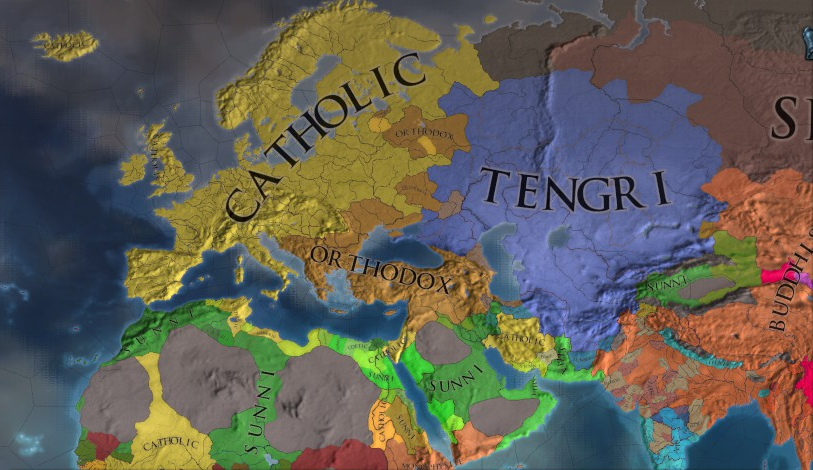
The Tengri world has the Mongols -- Golden Horde and Timurids -- who will probably end up losing out to Cumania and Perm due to their higher tech group.
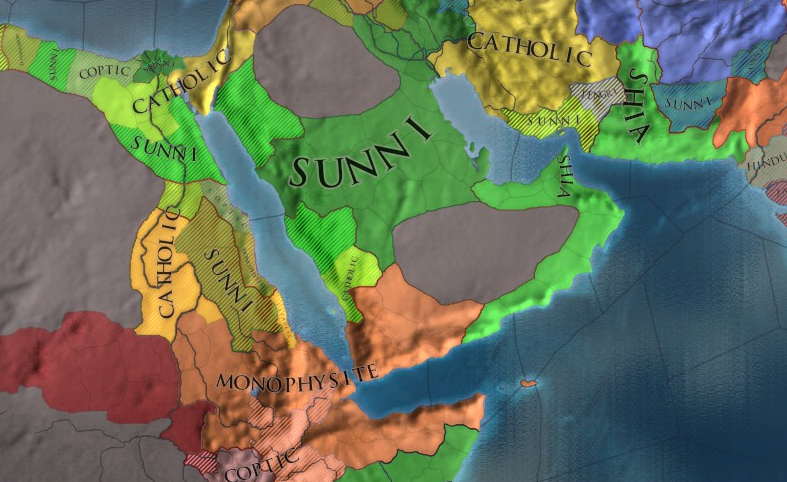
The most clash / diversity is in Africa & the Middle East, where you have Catholic, Shia, Sunni, and Monophysite nations all stacked up against one another. Shia never formed in CKII, but I decided to mod it in as part of the background in the hundred-year gap.
And as for religion:

The Tengri world has the Mongols -- Golden Horde and Timurids -- who will probably end up losing out to Cumania and Perm due to their higher tech group.

The most clash / diversity is in Africa & the Middle East, where you have Catholic, Shia, Sunni, and Monophysite nations all stacked up against one another. Shia never formed in CKII, but I decided to mod it in as part of the background in the hundred-year gap.
I think my favorite nation is that of those crazy Teutons in Persia  Please make a post about them!
Please make a post about them!
And I love those Iberian ideas, very thematic. It seems like you really want those Aragonese of yours to do some colonizing...
And I love those Iberian ideas, very thematic. It seems like you really want those Aragonese of yours to do some colonizing...
Interesting setup in Iberia, but wouldn't it be even more interesting if Navarra was made a march of the French crown? With your description and telling arond it, i have a feeling that it would be a fitting status.
- 1
A March.. Isn't that basically a super - militarized vassal?
And yes there are lots of Teutons in the Middle East as you'll see soon.. Thanks to a rogue sultan back in the day. And yes indeed I want to see Aragon do some colonizing -- but just wait and see what I did to Brittany!
And yes there are lots of Teutons in the Middle East as you'll see soon.. Thanks to a rogue sultan back in the day. And yes indeed I want to see Aragon do some colonizing -- but just wait and see what I did to Brittany!
Super? No, but frontier vassal yes. A bit like Charlemagne had in Spain in our reality.A March.. Isn't that basically a super - militarized vassal?
The annexation not being possible when being a march was on purpose for Navarra. The AI being bad with them will hopefully be fixed in the next EU4 update with the new fort system.Problem is that you can't annex marches and the AI is terrible at handing them

